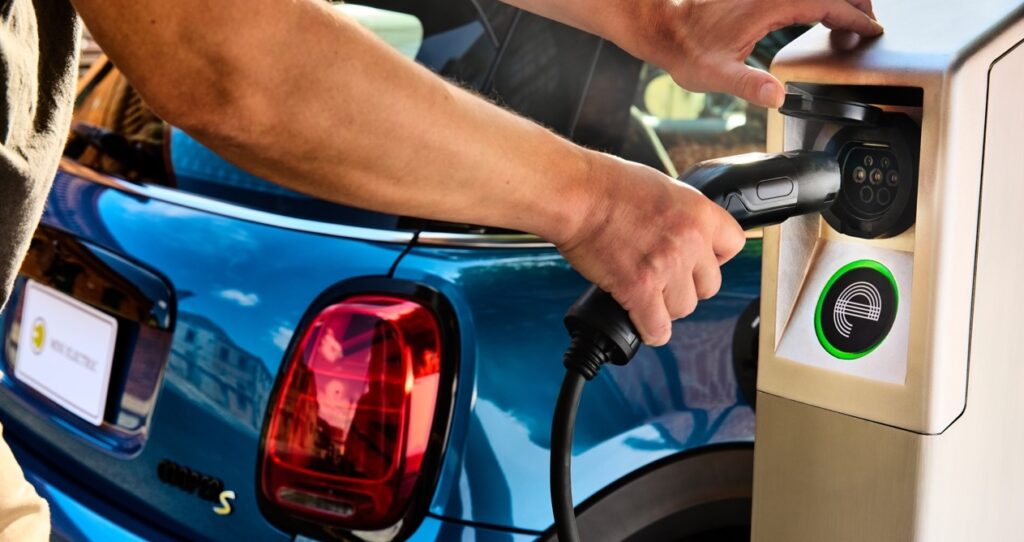Sign up for CleanTechnica’s Weekly Substack for Zach and Scott’s in-depth analyses and high level summaries, sign up for our daily newsletter, and/or follow us on Google News!

Ohfergawdsakes. Yes, they went there. Republicans in Congress have dropped the idea of funding the Trump-Musk budget cuts with a $20 fee on all passenger cars. Instead, they are pushing for a new tax on electric vehicles in the form of a new, nationwide $250 registration fee. So much for the tax-cutting, pro-business, law-and-order Republican party of yore.
Thoughts? After you drop a note in the comment thread, find your representatives in Congress and let them know what you think, too.
A New $250 Tax On Electric Vehicles
Some US states already put a special tax on electric vehicles, under the theory that EVs don’t contribute gas taxes to help with upkeep of the nation’s highways. Fair enough, but fair is fair. If fairness is the issue, the fee should be proportionate to the amount of gas taxes paid by gasmobile owners, and it’s clearly not.
Still, let’s take a look at the purported logic behind the new $250 EV tax proposal.
In a press release on April 29, the Republican chair of the House Transportation and Infrastructure Committee, Sam Graves, outlined a whole laundry list of actions aimed at slicing more than $10 billion from the federal deficit (btw that’s deficit, not debt).
Graves also made it clear that the real intent is to axe Biden-era “Green New Deal style programs,” while requiring electric vehicles to “begin paying for their use of the highway system just like other highway users,” in order to pay for other “historic improvements.”
“Importantly, our proposal more than offsets these historic investments and reduces the deficit with rescissions of wasteful Green New Deal style spending from the Inflation Reduction Act and ensuring that electric vehicles begin paying their share for their use of the nation’s highways,” Graves emphasized.
“It’s only fair that EVs pay these user fees like other motorists,” he emphasized again for good measure.
There’s just one problem, and it’s a big one. As far as user fees go, gas taxes are not a particularly precise way to measure how much use any particular driver gets out of the nation’s precious highways, but a per-gallon tax is at least meaningful to some degree. A flat-rate $250 tax — or call it a registration fee, whatever — doesn’t even go that far.
That’s Right, The Republicans In Congress Want A $250 Flat Tax On Electric Vehicles
When it comes to taxing electric vehicles, Graves does not mince words. The new proposal “ends free rides for electric vehicles (EVs) and ensures they begin paying into the Highway Trust Fund (HTF) for their use of the nation’s highways,” he states.
If replenishing the HTF is the aim, there are other ways to enable electric vehicles to contribute. After all, we’re in the age of connectivity and AI and all that what-not. A tax on EV charging sessions would accomplish the same thing, or maybe an annual odometer reading.
Be that as it many, on April 29 Graves indicated that a $200 tax would be sufficient. Something changed after markup on April 30, with Reuters among the news organizations reporting that House Republicans are now in favor of a new $250 EV tax. In for a penny, in for a pound.
The April 29 press release also indicated that an annual $20 tax/registration fee would begin on all passenger vehicles in 2031, ostensibly with the aim of eventually “repealing and replacing the broken gas tax and federal excise tax structure that has left the HTF bankrupt.”
Whelp, regardless of the Republicans’ best intentions, they dropped the $20 fee on all passenger cars like a hot potato just one day later, leaving the HTF to fix itself one way or another. Go figure!
Let’s Hear It For Zero Emission Mobility
On second thought, don’t bother trying to figure this out. Dropping the $20 tax on all passenger cars just doubles down on the mockery of imposing a $250 flat tax on electric vehicles (and hybrids, too, but that’s a whole ‘nother can of worms).
That’s on brand for today’s Republican Party, which has made mockery-making its stock in trade. Having successfully pulled the “trickle-down” wool over the eyes of a wide swath of the US electorate since the 1970s, they have moved on to bigger and better ways dip a hand into the wallets of regular folks, with Trump and Tesla CEO Elon Musk gleefully steering the ship.
Meanwhile, electric vehicle stakeholders just keep finding new ways to make BEVs the more economical choice for more of the US driving public. Writing for TopSpeed earlier this morning, for example, the auto industry reporter Michael Frank observed that “EVs are vehicles second, and energy piggy banks first.”
Frank cited ChargePoint CTO Hossein Kazemi, who described how grid-connected EVs enable their owners to sell electricity back to the grid. That will become an important hedge against utility bills in the future, as the expense of energy infrastructure upgrades and rising electricity demand begins hitting households and fleet owners.
“Well, quite simply, because if it remains plugged in, and you’ve set up via an app to sell energy back to the grid, the rate you pay for charging will drop, possibly far enough that you’re actually making money on the power you just bought — or at the very least, paying way less for what you need,” Frank summarized.
That’s familiar refrain over here at CleanTechnica, but it’s always nice to see it repeated elsewhere, and Frank has the receipts to back it up. In addition to speaking with Kazemi, he lists the St. Louis Federal Reserve, the U.S. Energy Information Administration, and the National Renewable Energy Laboratory, among other sources.
Everybody Loves Electric Vehicles
Republicans being Republicans, the new $250 tax on electric vehicles will probably make it to the final spending bill. Whether or not that’s enough to throttle back EV sales in the US is another kettle of fish.
Ford, for one, has been laying the groundwork for the long haul. Last fall the company began offering a complimentary home EV charging station to sweeten the pot for some of its EV models. The offer was supposed to lapse at the end of last year, but Ford keeps extending it, most recently until June 30.
Home EV charging also happens to be the sweet spot for grid-connected electric vehicles to take advantage of deals with their local utility. If all goes according to plan, thousands of new Ford EV owners will able to lend a word-of-mouth assist to the benefits of EV ownership on household budgets.
As for public EV charging stations, the Trump-Musk continuum has tried to throttle that back, too, but new charging stations keep popping up like mushrooms after the rain, helping to make EV ownership more accessible to the millions of households without access to home charging.
Photo: Republicans in Congress are gearing up to impose a new $250 tax on electric vehicles, having dropped the whole idea of being against taxes (via CleanTechnica archives).
Whether you have solar power or not, please complete our latest solar power survey.
Have a tip for CleanTechnica? Want to advertise? Want to suggest a guest for our CleanTech Talk podcast? Contact us here.
Sign up for our daily newsletter for 15 new cleantech stories a day. Or sign up for our weekly one on top stories of the week if daily is too frequent.
CleanTechnica uses affiliate links. See our policy here.
CleanTechnica’s Comment Policy




